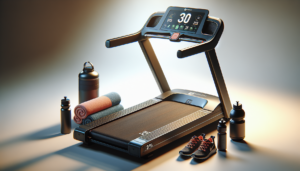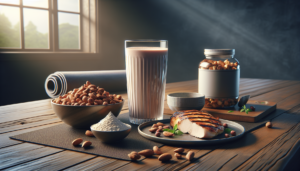Understanding the Importance of Meal Timing for Exercise
The timing of your meals and snacks can significantly impact your exercise performance and overall fitness goals. Consuming the right foods at the appropriate times before and after workouts is crucial for maintaining energy levels, promoting muscle growth and recovery, and avoiding gastrointestinal discomfort. By understanding the principles of meal timing for exercise, you can optimize your nutrition plan to get the most out of your workouts.
Why Meal Timing Matters
Eating too close to a workout can lead to digestive issues and reduced exercise performance. When you eat, your body diverts blood flow to the digestive system to process the nutrients, which can leave less energy and oxygen available for your muscles during exercise. This can result in fatigue, cramping, and suboptimal performance. On the other hand, working out on an empty stomach can leave you feeling weak and dizzy, as your body lacks the necessary fuel to power through your routine.
Proper meal timing allows you to strike a balance, providing your body with the energy it needs to perform at its best while avoiding post-meal fatigue and discomfort. By allowing adequate time for digestion before exercise and refueling with the right nutrients afterwards, you can enhance your workout results and support your fitness goals.
General Guidelines for Meal Timing
As a general rule, it’s recommended to wait 2-3 hours after a full meal before engaging in intense physical activity. This gives your body sufficient time to digest the food and redirect blood flow back to your muscles. For smaller meals or snacks, waiting 30-60 minutes before exercising is usually sufficient.
However, individual experiences can vary. Some people may feel comfortable working out sooner after eating, while others may require more time. Factors such as meal size, macronutrient composition, and personal digestive speed can all influence how long after eating to workout. It’s essential to listen to your body and find the timing that works best for you.
Digestive Times for Different Macronutrients
The three primary macronutrients – carbohydrates, proteins, and fats – have different digestive times that impact how quickly they become available as energy sources for exercise. Understanding these differences can help you plan your pre-workout nutrition more effectively.
Carbohydrates
Carbohydrates are the body’s preferred fuel source for high-intensity exercise. They are broken down into glucose, which is then used by the muscles for energy. Simple carbohydrates, such as those found in fruits, honey, and sports drinks, can be digested and absorbed relatively quickly, typically within 30-60 minutes. Complex carbohydrates, like those in whole grains and vegetables, take longer to digest but provide sustained energy release.
Consuming easily digestible carbohydrates before a workout can help top off your glycogen stores and provide quick energy for your muscles. However, eating too many carbohydrates too close to exercise can cause gastrointestinal distress, so it’s important to find the right balance and timing for your individual needs.
Proteins
Proteins play a crucial role in muscle repair and growth, but they are not a primary energy source during exercise. Protein-rich foods, such as meat, poultry, fish, eggs, and dairy products, generally take longer to digest than carbohydrates, around 60-90 minutes. Consuming protein before a workout can help prevent muscle breakdown and promote post-exercise recovery.
However, eating a large amount of protein right before exercise may not be optimal, as it can sit heavily in your stomach and divert blood flow away from your muscles. It’s generally recommended to consume protein as part of a balanced pre-workout meal a few hours before exercise or as a post-workout recovery snack.
Fats
Fats are an important part of a balanced diet but are not the ideal pre-workout macronutrient choice. Fats take the longest to digest, typically around 90-120 minutes, and can delay stomach emptying, which may lead to discomfort during exercise. Additionally, fats are not readily used as an energy source during high-intensity workouts.
While it’s important to include healthy fats in your overall diet, it’s best to limit fat intake in the hours leading up to your workout. Stick to easily digestible carbohydrates and lean proteins for your pre-exercise meals and snacks.
Pre-Workout Nutrition: What to Eat and When
Proper pre-workout nutrition can make a significant difference in your energy levels, performance, and overall workout experience. By consuming the right foods at the appropriate times, you can fuel your body for optimal results and avoid digestive discomfort.
Ideal Pre-Workout Meal Composition
An ideal pre-workout meal should provide a balance of easily digestible carbohydrates and lean proteins while being relatively low in fat and fiber. Aim for a meal containing around 50% carbohydrates, 20-30% protein, and 20-30% fat, consumed 2-3 hours before exercise. This composition ensures that you have sustained energy throughout your workout while minimizing the risk of gastrointestinal issues.
Some examples of balanced pre-workout meals include:
- Whole-grain toast with almond butter and sliced banana
- Grilled chicken breast with sweet potato and steamed vegetables
- Oatmeal with low-fat milk, berries, and a scoop of whey protein powder
For shorter workouts or if you have less time before exercising, opt for a lighter snack that focuses on easily digestible carbohydrates and a small amount of protein, such as a fruit smoothie with Greek yogurt or a small energy bar.
Foods to Avoid Before Exercise
Just as important as what you eat before a workout is what you should avoid. Certain foods can cause digestive discomfort, bloating, and fatigue, which can negatively impact your exercise performance. Some foods to steer clear of in the hours leading up to your workout include:
| Food Category | Examples | Reasons to Avoid |
|---|---|---|
| High-fat foods | Fried foods, heavy creams, cheeses | Slow digestion, potential stomach discomfort |
| High-fiber foods | Raw vegetables, whole grains, legumes | Can cause bloating and gas |
| Spicy foods | Hot peppers, spicy sauces | May cause heartburn and indigestion |
| Sugary foods | Candy, soft drinks, sugary baked goods | Quick energy spike followed by a crash |
Remember, everyone’s digestive system is different, so what works well for one person may not be ideal for another. Pay attention to how your body responds to various pre-workout foods and adjust your choices accordingly.
Hydration and Its Role in Exercise Performance
In addition to solid food, hydration plays a crucial role in exercise performance and overall health. Proper fluid intake before, during, and after your workouts can help regulate body temperature, transport nutrients, and remove waste products.
Importance of Staying Hydrated
Maintaining adequate hydration is essential for optimal exercise performance. When you exercise, your body loses fluids through sweat, which can lead to dehydration if not replenished. Even mild dehydration can cause fatigue, reduced endurance, and impaired cognitive function, all of which can negatively impact your workout.
Staying hydrated helps:
- Regulate body temperature
- Maintain blood volume and cardiovascular function
- Transport oxygen and nutrients to working muscles
- Remove metabolic waste products
- Lubricate joints and reduce risk of injury
Aim to drink water consistently throughout the day and pay extra attention to your fluid intake before, during, and after exercise.
Hydration Tips for Optimal Performance
To ensure you stay well-hydrated for your workouts, follow these tips:
- Drink 17-20 ounces of water 2-3 hours before exercise
- Drink another 8 ounces 20-30 minutes before your workout
- During exercise, drink 7-10 ounces every 10-20 minutes
- Post-workout, drink 16-24 ounces of water for every pound of body weight lost during exercise
- Monitor urine color: aim for pale yellow, which indicates adequate hydration
In addition to water, you can also hydrate with other beverages like coconut water, sports drinks (for intense workouts lasting more than an hour), and herbal teas. Avoid excessive caffeine and alcohol, as they can have a diuretic effect and contribute to dehydration.
Listening to Your Body: Individual Variations in Meal Timing
While general guidelines for meal timing and exercise provide a solid foundation, it’s essential to remember that everyone’s body is unique. What works well for one person may not be optimal for another. Factors such as age, gender, body composition, metabolic rate, and physical activity level can all influence how your body responds to food and exercise.
Recognizing Signs of Proper Timing
Pay attention to how your body feels before, during, and after workouts. Signs that you’ve found the right meal timing for your individual needs include:
- Sustained energy levels throughout your workout
- Absence of digestive discomfort or bloating
- Improved exercise performance and endurance
- Faster post-workout recovery
On the other hand, if you consistently experience fatigue, stomach upset, or suboptimal performance, it may be a sign that you need to adjust your meal timing or food choices.
Adjusting Based on Personal Experience
Don’t be afraid to experiment with different meal timings and macronutrient ratios to find what works best for your body. Keep a food and exercise journal to track your intake, workout performance, and any symptoms or sensations you experience. Over time, you’ll start to identify patterns and can make informed adjustments to your routine.
Remember that your body’s needs may change over time due to factors like age, stress levels, and training intensity. Be willing to adapt your meal timing strategy as needed to support your evolving fitness goals and overall well-being.
Conclusion: Optimizing Your Workout with Proper Meal Timing
Meal timing is a crucial aspect of exercise performance and overall fitness success. By understanding the importance of pre- and post-workout nutrition, the digestive times of different macronutrients, and the role of hydration, you can create a personalized plan that fuels your body for optimal results.
Remember to listen to your body and make adjustments based on your individual needs and experiences. With a strategic approach to meal timing and a commitment to consistent, well-rounded nutrition, you’ll be well on your way to achieving your fitness goals and feeling your best both in and out of the gym.






